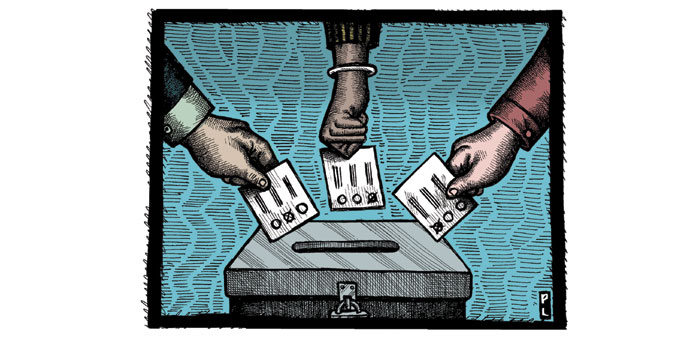|
Judging from the headlines, one might get the impression that the 400mn citizens eligible to participate in the recent European Parliament elections voted massively against the European Union. True, anti-establishment, mostly Eurosceptic, parties won about one-fifth of the vote. But to characterise the election result as a rejection of Europe simply is not quite accurate (or fair). |
For starters, although much has been made of the argument that the EU is too far removed from its citizens, opinion polls have shown consistently that public trust in the major European institutions remains higher than trust in national institutions. Across the EU, the European Parliament still has higher approval ratings, on average, than national parliaments.
Although the trust gap has narrowed somewhat in recent years, even the continuing recession, which is often blamed on EU-imposed austerity and the crisis in the eurozone, has only marginally reduced the European Parliament’s advantage over national parliaments.
Recent polls suggest that, across Europe, about 40% of the population still trust the European Parliament, whereas only 25% trust their national parliaments. Moreover, the European Parliament retains much higher trust than the US Congress, which has approval ratings that are now below 10%. Given the general loss of trust in parliamentary institutions on both sides of the Atlantic, the European Parliament is doing relatively well.
Moreover, not all protest parties reject the EU. In Europe’s crisis-affected countries, young people, who have been hardest hit, voted en masse for leftist “anti-austerity” parties, most notably in Greece. But these parties do not reject the EU. On the contrary, they want more solidarity from the EU, which would enable their governments to spend more.
The anti-austerity protest vote is strongest where governments have been unable to implement reforms effectively (for example, in Greece), in contrast to Portugal and Spain, whose economies are recovering on the back of strong exports. In Italy, Prime Minister Matteo Renzi’s new government has been able to stem the tide of Euroscepticism by undertaking concrete reforms and not blaming the EU for every problem the country faces.
The rejection of the EU seems more fundamental in parts of northern Europe, where the elderly tend to vote for right-wing populist parities. Especially in the United Kingdom and France, unemployment and a perceived lack of control over borders have played a large role in fostering disaffection with the EU. This is particularly worrying, given that both countries’ problems have little to do with EU policies. France’s economic malaise cannot be blamed on austerity imposed from Brussels, and the UK is not even in the eurozone.
Populists in both countries campaigned successfully on non-issues. All available studies show that “welfare tourism” is a limited phenomenon, and that immigration fosters economic growth. But these facts do not count when wages are stagnating (as in the UK) or unemployment continues to rise (as in France). Populists can easily project these problems onto “Europe”, which in this case merely represents fear of the outside world in general.
The EU is thus caught between demands for more solidarity from the young in its southern members and dissatisfaction with open borders among the elderly in the north. It is tempting to try to mollify both groups by relaxing austerity and ditching the border-free Schengen area. But that is unlikely to swing the political pendulum back toward Europe, especially in countries like France and the UK.
The deeper roots of the surge of Eurosceptic and other protest parties originate with the general dissatisfaction with the state of the economy and dysfunctional national political systems. Tinkering with austerity or the fundamental right of free movement within the EU will not make much of a difference. Reform is needed at home, in national capitals.
In this context, the selection of the European Commission’s next president – now the focus of considerable attention – is a sideshow. Whoever is chosen will be able to make the EU work only if French President Francois Hollande can build a domestic pro-reform consensus and British Prime Minister David Cameron can convince his electorate that immigrants (only one-third of whom come from the poorer EU member states) benefit the UK economy.
The EU does not have a significant budget, and it sets at most a general framework for economic and social rules that vary widely across a large and diverse continent. Success and failure are largely determined at the national level. That is where the problems lie and where they must be solved. What has taken the form of an anti-EU vote constitutes in reality a protest against socio-economic problems at home.- Project Syndicate
♦ Daniel Gros is director of the Center for European Policy Studies.

